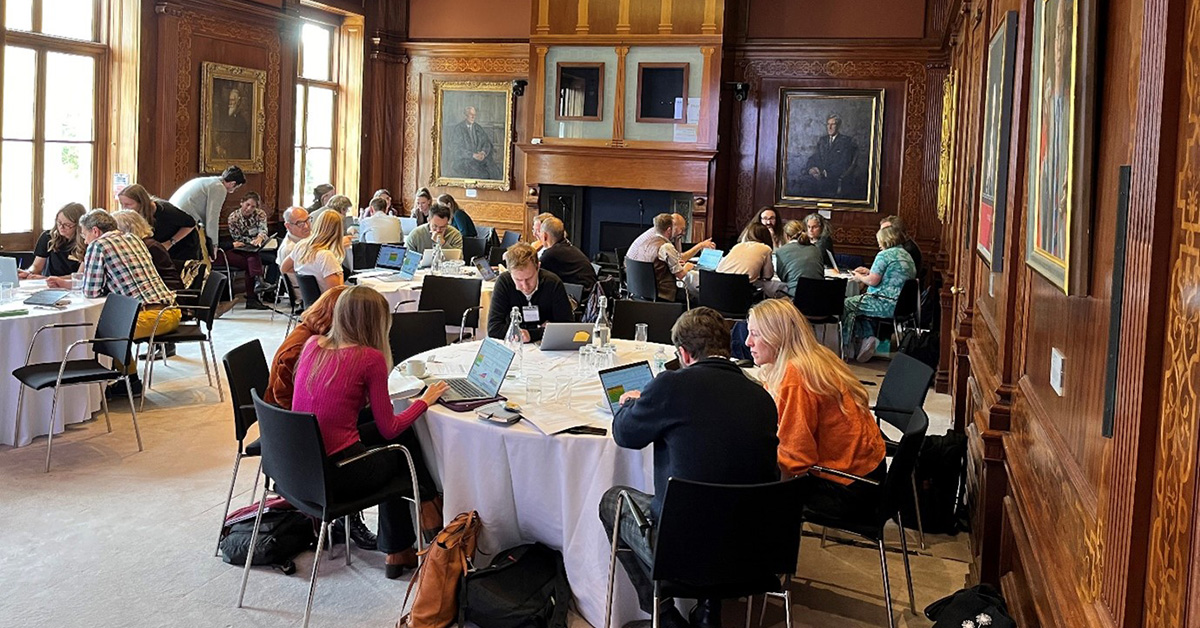On 10 October 2024 stakeholders from across the UK and devolved nations gathered at the Royal Society in London for a workshop on modelling land use policy options. Sarah Sinclair tells us more…
Pressures on land use are intensifying, with the need to balance climate, food, housing and nature goals. Understanding the impacts of land use and environmental policies has never been more urgent. Hosted by the UK-FABLE (Food, Agriculture, Biodiversity, Land Use, and Energy) team—a collaboration between the UK Centre for Ecology & Hydrology and the Environmental Change Institute at the University of Oxford—our recent workshop explored how modelling tools like the FABLE Calculator can support policy and decision-making in the UK and devolved nations.
The one-day event began with an overview of challenges related to land use and net zero, followed by an introduction to the FABLE Consortium, a global network of national research organisations developing nation-scale food and land use strategies. The UK-FABLE team also presented the 2023 FABLE modelling results for the UK, published as part of the Sustainable Development Report 2024.
They described three pathways—Current Trends, National Commitments, and Global Sustainability—which were co-developed with policymakers to assess the impacts of various practices and policies on the UK's food and land-use systems through to 2050. The pathways address how to reach critical targets for food security, nutrition, greenhouse gas emissions reduction, biodiversity conservation, and sustainable water use.
Next, we heard about current policy ambitions for land use and related evidence needs from a panel of policy officials from the UK and devolved nations. Speakers from the UK Department of Energy Security and Net Zero (DESNZ), the Department of Environment, Food and Rural Affairs (DEFRA), and equivalent departments in Northern Ireland (DAERA), the Welsh Government and the Scottish Government spoke about their key challenges and highlighted potential evidence gaps that could be addressed by models like the FABLE Calculator. The discussion that followed identified common goals in policy ambitions between England, Wales, Scotland and Northern Ireland, as well as differences reflecting the context of the individual nations.

In the afternoon, attendees had the chance to use the FABLE Calculator. They adjusted different policy settings in the model to see their effect on outcomes for land use, greenhouse gas emissions, land suitable for biodiversity, and food consumption. This was followed by an opportunity to build their own sustainable pathways. The policy options included crop and livestock productivity, diet, food waste, and land use changes like afforestation, agro-forestry, agroecological practices, grassland, peatland, protected areas and urban expansion.
Participants were encouraged to explore how the policy levers affected net zero goals, biodiversity, and food productions, and any combined effects, benefits or trade-offs they noticed between these different goals.
The workshop concluded with roundtable discussions on the relevance of FABLE modelling to current policy challenges, including how FABLE could be used in the policy process, key priorities for future model development, and additional options to include within future pathways.
Participants liked the ability of the FABLE calculator to provide a simple, transparent, high-level picture of policy options across multiple sectors, but felt the 2050 timeline was too short to see the full benefits of some policy options such as creating new woodland. Some participants requested the capacity to model certain technological innovations, as well as provide more information on the economic costs and benefits of the changes.
Overall, the workshop provided an excellent opportunity for stakeholders from across the UK to learn more about the FABLE model and its capabilities, as well as to provide feedback on the potential limitations and requests for future enhancements.
